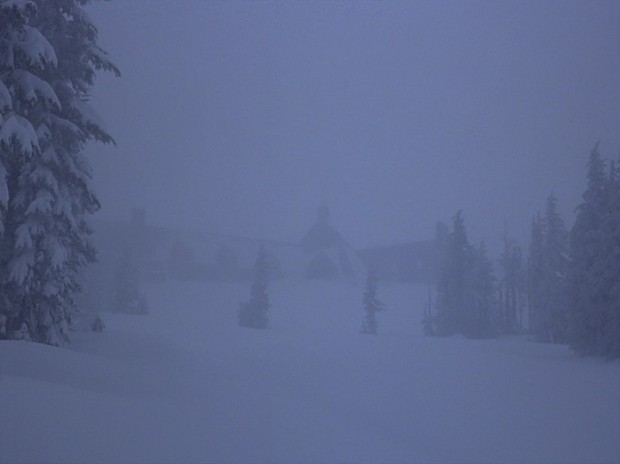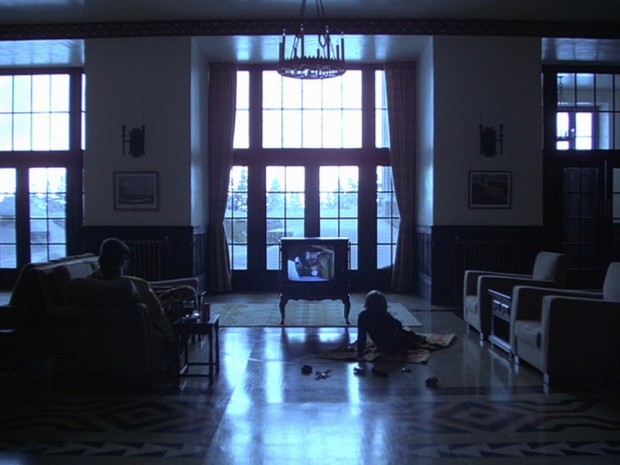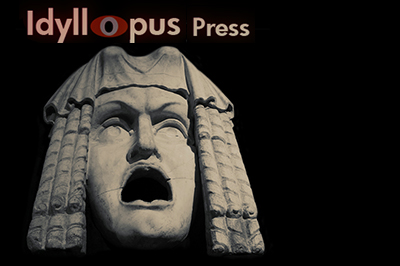
Go to Table of Contents of the analysis (which has also a statement on purpose and manner of analysis and a disclaimer as to caveat emptor and my knowing anything authoritatively, which I do not, but I do try to not know earnestly, with some discretion, and considerable thought).
In the Saturday section, before this one, Wendy discovers the phone lines are down, she can no longer call out and must now use the radio.
The opening shot for Saturday of the hotel shows it not only snowbound but with no lights shining. In all other depictions of the hotel there will be at least one or two lit windows.
Jump forward to Monday. This section opens with Wendy and Danny watching a movie on the television. The movie is The Summer of 42, and is a WWII story (which I have written extensively about elsewhere).
There appears to be no electrical cord leading to the television, as if even it is shining, playing burnt toast, pictures of things that have happened.
Some individuals might instead say it is a matter of set design, that Kubrick perhaps didn't want a messy television cord ruining the image. It would be insisted we shouldn't notice there is no cord. Kubrick had never intended us to notice there is no cord.
Danny asks to go up and get his fire truck from their suite.
Danny is wearing a red plaid shirt with a blue sweater over it on which is an old version of Mickey Mouse kicking a football. This seems to have to do with the 1932 film Touchdown Mickey. I've watched that cartoon, however, and didn't see in it Mickey kicking the ball, he is always running with it. But it is certainly a Mickey from that period, before 1939, when Mickey's eyes changed from their black button form. This looks like an image that could have come from that cartoon, if he had kicked the ball. Mickey's design is the same and he is dressed as he was in the cartoon.
Touchdown Mickey is, after all, meaningful. I find there used to be a story that on September 1, 1939, the BBC shut down for security reasons, on the day that Germany invaded Poland, which was two days before Britain declared war on Germany. Wikipedia states they were concerned VHF transmissions would "act as a beacon to enemy aircraft homing in on London". The BBC wouldn't return until after WWII. Public memory had the programming shutting down abruptly during a Mickey Mouse cartoon, but which one? Some said programming was interrupted when Mickey was kissing Greta Garbo in Mickey's Gala Premiere.
Radio TImes' published schedule showed that Touchdown Mickey was playing at 3:30 when BBC went off the air. But the Television Heaven website relates that another document of the broadcast log shows Mickey's Gala Premiere played at 12.05.05. This was followed at 12.13.00 by "Sound and vision tuning signals (for Test Purposes)", and then the broadcast closed at 12.35.00. Television Heaven states there's no known reason why Mickey's Gala Premiere replaced Touchdown Mickey, and why it played so much earlier.
Recollect that the phone lines are down. Wouldn't it stand to reason the electric lines are down? Perhaps the hotel has its own generator. But doesn't it seem unlikely they would be able to get television programming, and Kubrick has pointed that out to us with the television not seeming to show a cord plugged into the wall. We have the theme of isolation throughout The Shining. But what Kubrick is seeming to tell us is that we are seeing things that couldn't be happening. The television shouldn't be playing the movie. Like the BBC programming, with the onset of WWII, there should be dead air. We are placed in the position of not knowing what we are watching. Is the broadcast a ghostly apparition courtesy of the hotel or is this more on the surreal/expressionistic layer that informs the viewer the film can't be comprehended as "realistic". Though Kubrick's films appear realistic in manner, the deeper one goes into them the more inescapable it is that Kubrick opens doors throughout them that admit the audience to an entirely different experience in which we are intended to be highly conscious of the artifice of the set and examine instead the relationship of medium with the viewer.
In Mickey's Gala Premiere, when Garbo is kissing him it is on stage in Hollywood after the big premiere of a cartoon he's in. As Garbo is kissing him, he wakes up, at 12:55, to find his dog, Pluto, licking him. The Garbo kiss was a completely different real life that the Pluto kiss made into another story by the sleeping Mickey's dreaming mind. We might compare this to when Jack is in room 237, begins kissing a beautiful woman, and then finds instead it is the corpse of an old woman.
Knowing what we do about Touchdown Mickey and WWII, we may now look at Mickey kicking the football, which doesn't happen in Touchdown Mickey, examine again his posture, and see it in a different light when we look at an image of goose-stepping soldiers from the invasion of Poland.


In my analysis I had already noted how Danny's posture seems to echo Mickey, with his arms held back behind him, which is why I had initially captured this frame. Some may wonder if Danny is then depicted as representing fascism. No, instead he is wearing a representation of what is happening, which is also itself, indeed, a kind of "burnt toast". With that image comes all these other associations.
At the end of Full Metal Jacket the Marines sing, "M-I-C-K-E-Y M-O-U-S-E. We play fair and we work hard and we're in harmony." That takes us back to Jack's repeating the phrase over and over again, "All work and no play make Jack a dull boy", but we may also now see that it returns us to the significance of Danny's sweater in relation to WWII. As with other analysts, I have held that in Kubrick's work there are references to the war and the holocaust. In The Shining, Jack becomes possessed with the spirit of authoritarianism, an acolyte of fascist power, even willing to control his family through murder.
I note also in my analysis, when discussing this Monday section, that James Mason, who played Humbert in Kubrick's Lolita, visited the set of The Shining, for I make a connection between Danny wanting his fire engine and Lolita waking Humbert, at the Enchanted Hunters Hotel, jokingly crying fire, that the hotel is burning down.
It is Vivian Kubrick's documentary of the making of The Shining, that documents James Mason's visit, appearing in the suite. He was working on a Sherlock Holmes film and wears a period costume from it. In the film he played Dr. Watson. The film was Murder by Decree, based on the novel, Jack the Ripper: The Final Solution, in which a Masonic conspiracy covers up the fact it was a noble who carried out the murders. I am less interested in any comparison being drawn between Jack the Ripper and Jack with his axe, than the term "The Final Solution", for "The Final Solution of the Question of the Jews" was the code name for the plot concerning their extermination by the Nazis. It seems to me that is at the very least a possibility that Kubrick, who I believe had final say on Vivian's film, was conscious of this and saw in Mason's visit an opportunity to include this oblique reference to the holocaust.
I'd examined the cartoon before but I wasn't aware of this lore, which is why I didn't put this together until now.
September 2018. Approx 1256 words or over 2 single-spaced pages. A 10 minute read at 130 wpm.
Return to the top of the page
Return to Table of Contents for "The Shining" analysis
Link to the main Kubrick page for all the analyses



